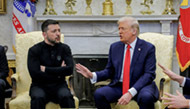Artist Took the Role of China’s Conscience
In a 30-year career Mr. Ai has combined, often at calculated personal risk, both aspects of his persona to create a role as an outspoken critic of the Chinese government .
China acknowledged on April 7 that Mr. Ai is indeed in custody. He was under investigation, a spokesman said, for “economic crimes.”
From a Western perspective, Mr. Ai’s career fits a familiar profile.
In the 1990s he painted Coca-Cola logos on ancient Chinese pots, broke up classical Chinese furniture and photographed himself making a single-digit rude gesture in front of the White House, the Eiffel Tower and Tiananmen Square.
But gradually such Duchampian moves have given way to large-scale, socially critical projects. For a conceptual piece called “Fairytale” at the 2007 Documenta in Kassel, Germany, he placed 1,001 antique Chinese chairs, available for use, throughout the exhibition. He built an outdoor structure from 1,001 doors salvaged from Ming and Qing houses that had been eliminated by rampant development in Chinese cities. Through the Internet he recruited 1,001 Chinese citizen-volunteers to come to Kassel to live for the duration of the show.
In short, he brought a sense of China that was at once inviting, puzzling and pathetic. Politically, he was coming to be known to the Chinese authorities : a late-1970s free-speech agitator, later a member of renegade art movements, and a full-time resident of New York from 1981 to 1993. But as an international celebrity he was still considered an asset to Beijing at a time when the country was making an all-out effort to become a major cultural presence prior to the 2008 Beijing Summer Olympics.
With this in mind the Chinese government asked Mr. Ai to collaborate with the Swiss architectural firm Herzog & de Meuron on the design for the Olympic stadium, known as the Bird’s Nest. He did so. The result was a triumph.
Then he denounced the Olympics as a ploy to disguise the repressive nature of China’s regime . And after the Sichuan earthquake in May 2008, he used films and a blog to denounce Sichuan officials for financial corruption that resulted in structurally faulty schools. His accusations of a cover-up extended to the highest levels in Beijing.
To anyone familiar with China’s harsh official politics, the silence from the government in Beijing was perplexing. But at this juncture, both parties were almost ceremonially enacting ancient roles. In Chinese culture, going back to Confucius, there has been a tradition of individual scholars and intellectuals denouncing rulers for wrongdoing that was bringing disharmony to society.
But Mr. Ai’s attacks on political authority grew sharper, more persistent, more amplified, and what immunity from reprisal he might once have enjoyed was soon gone.
In 2009 he was beaten by the police and underwent surgery for a cerebral hemorrhage. The same year, his blog was shut down . In 2010 he was put under house arrest in Beijing while a newly built studio in Shanghai was razed by city authorities .
And recently, after popular uprisings in the Arab world , the Chinese authorities have initiated a virulent crackdown, and Mr. Ai is far from alone in feeling the force of it .
But this May an outdoor sculptural piece by Mr. Ai, called “Circle of Animals/ Zodiac Heads,” will be installed at the Pulitzer Fountain outside the Plaza Hotel in Manhattan. They are based on a set of similar sculptures that once adorned a fountain at the 18th-century imperial Summer Palace called Yuanming Yuan near Beijing. In 1860 French and British soldiers occupying China torched the palace and carried off the zodiac heads, an act that to this day evokes popular outrage in China as an example of colonialist humiliation and of everything hateful about the West.
Getting all the heads back - only some have been returned - has become an impassioned nationalist mission. What can the Chinese feel about Mr. Ai symbolically plunking the whole set down in New York ? and, later this year, in London and Los Angeles?
He has symbolically reconstituted an iconic piece of China’s patrimony, but he has done so, perversely, on enemy turf. Yet in the end only one political reality matters: if China prevents Mr. Ai from appearing at the sculpture’s New York debut on May 2, much of the rest of the world will demand to know why.
HOLLAND COTTER
스마터리빙
more [ 건강]
[ 건강]이제 혈관 건강도 챙기자!
[현대해운]우리 눈에 보이지 않기 때문에 혈관 건강을 챙기는 것은 결코 쉽지 않은데요. 여러분은 혈관 건강을 유지하기 위해 어떤 노력을 하시나요?
 [ 건강]
[ 건강]내 몸이 건강해지는 과일궁합
 [ 라이프]
[ 라이프]벌레야 물럿거라! 천연 해충제 만들기
 [ 건강]
[ 건강]혈압 낮추는데 좋은 식품
[현대해운]혈관 건강은 주로 노화가 진행되면서 지켜야 할 문제라고 인식되어 왔습니다. 최근 생활 패턴과 식생활의 변화로 혈관의 노화 진행이 빨라지고
사람·사람들
more많이 본 기사
- [‘로드 레이지’ 한인 피살 현장 상세 상황] 끼어들기 시비가 비극으로… 차에서 내려 “쏴봐라” 언쟁
- 우크라, 20개항 종전안 최신판 공개…영토 할양은 ‘미해결’
- [이민 단속] 여권 소지 시민권자들 … 1
- 가난해서 흙 팠는데… ‘다이아’ 캤다
- [성탄절 문 여는 곳은] 코스코·월마트 닫고… CVS는 영업
- 트럼프, ‘나비넥타이’ 매고 연말 대중문화 시상식 일부 진행
- 크리스마스 대형 폭풍… 침수·산사태 대비 ‘비상’
- 트럼프 행정부, H-1B비자 추첨 내년 2월 폐지…고임금 인력 우대
- 취업비자(H-1B), 고연봉자 우선 발급
- 美, 물류거점창고에 불체자 8만명 수용 추진… ‘아마존택배’ 방식
- MC몽, 차가원 회장 충격 불륜 부인.. “채무 120억 당연히 이행”
- “다카이치 내년 3월 후반 미국서 트럼프와 회담 타진”
- [이민 단속] 새해에도 더 공격적 단속
- 군 장교에서 글로벌 교육 리더로‘제2의 인생’ 을 살다
- 이대우 뉴저지한인회장, “적자 개인적으로 전액변제”
- 뉴욕시 최저임금 인상⋯ 1월1일부터 17달러
- 연방대법, 시카고 주방위군 투입 ‘기각’
- 해병대전우회 동부연합회·뉴욕해병대전우회 송년회
- 두 손 모아 성탄기도… “온 세상에 평화를”
- 역주행 승용차 덮쳐 한인 등 2명 사망
- [삶과 생각] 제도화된 불법, 합법의 가면을 쓴 민주주의 붕괴
- 브라운대 총격범, 대학원 중퇴후 고립된 삶… “유령같은 존재”
- 아시안아메리칸사법경찰자문위원회 송년회
- 46회째 1등 안나온 파워볼 복권 당첨금 17억달러로 껑충 뛰어
- ‘마약 혐의’ 남양유업 창업주 외손녀 황하나 경찰에 체포
- 윌리엄 컬렌 브라이언트 고교 한국어반 삼성전자 북미사옥 현장학습
- 비전케어 USA 무료 백내장 수술
- 롱아일랜드한국학교 종강식
- 맘다니, 샌더스 의원 앞에서 취임선서
- 엡스타인 자료 추가 공개… “전용기에 트럼프 8번 타”
- [부 고] 박종군 전 뉴욕청과협회장 별세
- 뉴저지한국학교 종강식^ 학습발표회
- 차기 대선 선호도… 공화 ‘밴스’ ·민주 ‘뉴섬’ 선두
- 기부 줄이는 미국인들…트럼프·고물가·탈종교 3중 한파
- 트럼프 “마두로 물러나라” 최후통첩
- 안보리서 ‘베네수엘라’ 긴급회의…美 “합법” vs 중러 “주권침해”
- 불체자 자진출국하면 지원금 3배로 ‘3천불’
- ‘파워볼’ 열풍 계속… 오늘 잭팟상금 17억 달러
- 온라인쇼핑과 반품, 그리고 그 이후 1
- [미국은 지금] MAGA의 분열, 예… 1
- 뉴욕한국라이온스클럽· 뉴욕한인합창단 한 해 마무리 합동 송년회 성황
- 해외서도 극과극 반응’대홍수’, 넷플릭스 글로벌 1위 차지”SF 걸작 vs 최악”
- “온 세상에 평화를⋯”
- [남가주 6개 은행 전국 예금 현황] 1억달러 이상 예금고 지점 99개
- [‘로드 레이지’ 한인 피살 현장 상세 상황] 끼어들기 시비가 비극으로… 차에서 내려 “쏴봐라” 언쟁
- H-1B비자 고임금·경력자에 우선권
- 트럼프의 새 독트린 “미국을 다시 왜소하게”
- 미 해군 군함 명칭 전통 깬 ‘트럼프급 전함’
- 정동원, 내년 2월 23일 해병대 입대..전역 예정일은 27년 8월 22일
- 이하늬, 기획사 미등록 혐의 검찰 송치.. “10월 정식 등록”
1/5지식톡

-
 미 육군 사관학교 West Poin…
0
미 육군 사관학교 West Poin…
0https://youtu.be/SxD8cEhNV6Q연락처:wpkapca@gmail.comJohn Choi: 714-716-6414West Point 합격증을 받으셨나요?미 육군사관학교 West Point 학부모 모…
-
 ☝️해외에서도 가능한 한국어 선생님…
0
☝️해외에서도 가능한 한국어 선생님…
0이 영상 하나면 충분합니다!♥️상담신청문의♥️☝️ 문의 폭주로 '선착순 상담'만 진행합니다.☎️ : 02-6213-9094✨카카오톡ID : @GOODEDU77 (@골뱅이 꼭 붙여주셔야합니다…
-
 테슬라 자동차 시트커버 장착
0
테슬라 자동차 시트커버 장착
0테슬라 시트커버, 사놓고 아직 못 씌우셨죠?장착이 생각보다 쉽지 않습니다.20년 경력 전문가에게 맡기세요 — 깔끔하고 딱 맞게 장착해드립니다!장착비용:앞좌석: $40뒷좌석: $60앞·뒷좌석 …
-
 식당용 부탄가스
0
식당용 부탄가스
0식당용 부탄가스 홀세일 합니다 로스앤젤레스 다운타운 픽업 가능 안녕 하세요?강아지 & 고양이 모든 애완동물 / 반려동물 식품 & 모든 애완동물/반려동물 관련 제품들 전문적으로 홀세일/취급하는 회사 입니다 100% …
-
 ACSL 국제 컴퓨터 과학 대회, …
0
ACSL 국제 컴퓨터 과학 대회, …
0웹사이트 : www.eduspot.co.kr 카카오톡 상담하기 : https://pf.kakao.com/_BEQWxb블로그 : https://blog.naver.com/eduspotmain안녕하세요, 에듀스팟입니다…
케이타운 1번가
오피니언
 정숙희 논설위원
정숙희 논설위원온라인쇼핑과 반품, 그리고 그 이후
 파리드 자카리아 / 워싱턴포스트 칼럼니스트 / CNN ‘GPS’ 호스트
파리드 자카리아 / 워싱턴포스트 칼럼니스트 / CNN ‘GPS’ 호스트 트럼프의 새 독트린 “미국을 다시 왜소하게”
 김동찬 시민참여센터 대표
김동찬 시민참여센터 대표 [미국은 지금] MAGA의 분열, 예견된 균열의 시작
 임지영 (주)즐거운 예감 한점 갤러리 대표
임지영 (주)즐거운 예감 한점 갤러리 대표 [수요 에세이] 삶이라는 배를 타고
 이영창 / 한국일보 기자
이영창 / 한국일보 기자[지평선] ‘인간GPT’ 환각의 부작용
 조환동 / 편집기획국장·경제부장
조환동 / 편집기획국장·경제부장 AI로 가속화되는 노동시장 개편
 민경훈 논설위원
민경훈 논설위원‘크리스마스 캐롤’과 산타 클로스
 정재민 KAIST 문술미래전략 대학원 교수
정재민 KAIST 문술미래전략 대학원 교수 [정재민의 미디어풍경] 적과의 동침, 협력하며 경쟁하기
 김영화 수필가
김영화 수필가 [화요칼럼] 단호박의 온기
1/3지사별 뉴스

“온 세상에 평화를⋯”
숨가쁘게 달려온 2025년을 이제 1주일 남짓 남긴 채 크리스마스 이브를 맞는다. 다사다난했던 한 해를 되돌아보며 마무리하는 연말 시즌과 크리…
H-1B비자 고임금·경력자에 우선권

‘올해는 ICE 이민자 체포 광풍의 해’
올 한해동안 버지니아와 메릴랜드, DC 등에서 연방 이민당국에 체포된 사람이 1만명이 훌쩍 넘는 것으로 조사됐다. 또 미 전국적으로는 22만명…
“ATM기 사용하기 겁나네”

연말 ‘로드레이지’ 비극… 한인 총격 피살
연말을 맞아 도로 위에서 순간적으로 벌어진 운전 중 시비가 40대 한인 가장의 총격 피살 비극으로 이어졌다. 워싱턴주 레이시 경찰국과 서스턴 …
[‘로드 레이지’ 한인 피살 현장 상세 상황] 끼어들기 시비가 비극으로… 차에서 내려 “쏴봐라” 언쟁

오늘 하루 이 창 열지 않음 닫기 





















































.png)


댓글 안에 당신의 성숙함도 담아 주세요.
'오늘의 한마디'는 기사에 대하여 자신의 생각을 말하고 남의 생각을 들으며 서로 다양한 의견을 나누는 공간입니다. 그러나 간혹 불건전한 내용을 올리시는 분들이 계셔서 건전한 인터넷문화 정착을 위해 아래와 같은 운영원칙을 적용합니다.
자체 모니터링을 통해 아래에 해당하는 내용이 포함된 댓글이 발견되면 예고없이 삭제 조치를 하겠습니다.
불건전한 댓글을 올리거나, 이름에 비속어 및 상대방의 불쾌감을 주는 단어를 사용, 유명인 또는 특정 일반인을 사칭하는 경우 이용에 대한 차단 제재를 받을 수 있습니다. 차단될 경우, 일주일간 댓글을 달수 없게 됩니다.
명예훼손, 개인정보 유출, 욕설 등 법률에 위반되는 댓글은 관계 법령에 의거 민형사상 처벌을 받을 수 있으니 이용에 주의를 부탁드립니다.
Close
x